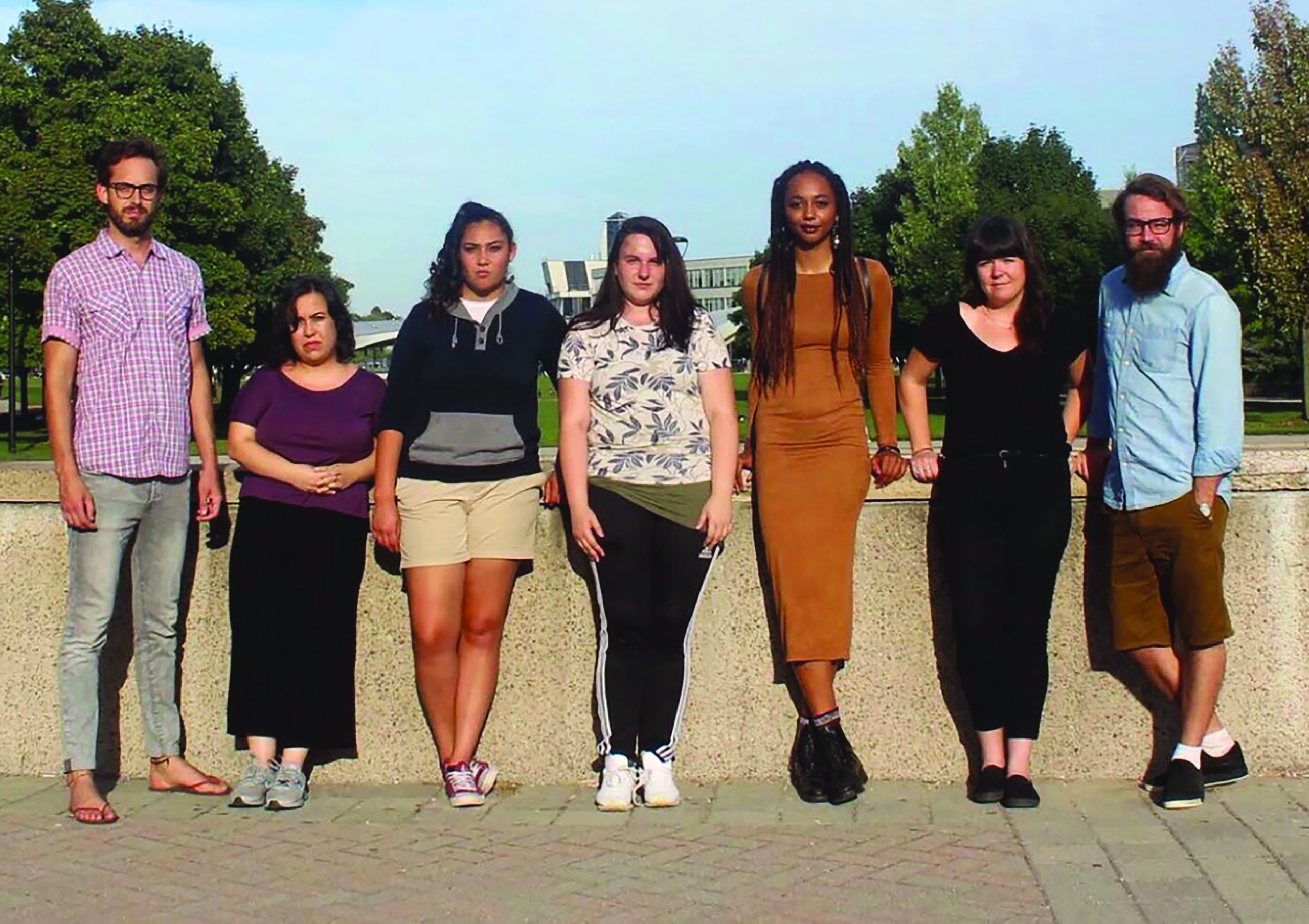Victoria Silman | Assistant News Editor
Featured Image: Seven of the eight students involved in the case are pictured from left to right—Stuart Schussler, Gizem Cakmak, Karmah Dudin, Carrie Cooper, Susanna Hermanns, Susannah Mulvale, and Tyler Ball. | Aaron Kreuter
Eight students are facing disciplinary proceedings under the Student Code of Conduct (SCOC) after taking part in a staged sit-in within the Senate Chambers to protest the strike during the Winter term.
The sit-in began March 22 and involved a large group of students, however only eight of those who participated are being reprimanded for their actions—five graduate students and three undergraduate students.
Karmah Dudin, a fifth-year political science student, is one of the three undergraduates involved in the case. According to her, “a huge group of people were involved in a lot of strike actions, like the reclamation and occupation of the Senate Chambers that was happening from March until June.”
Tyler Ball, a graduate student involved in the proceedings, explains: “Complaints were filed on August 3, but weren’t disclosed to us until August 9, which is the day after CUPE 3903 dropped its Unfair Labour Practice cases against York University.”
“York is demanding tribunals, which carry the most severe punishments and may result in expulsions,” adds Ball.
Along with Dudin, two other students—Susanna Hermanns and Carrie Cooper are being represented by attorney Asaf Rashid of Asaf Rashid Law in Toronto. Rashid explains that the students came to him after complaints were filed against them.
“These disciplinary proceedings raise a number of legal issues. Front and centre is the right of students to free expression and assembly on campus—the right to protest,” says Rashid.
Ball, along with the four other graduate students—Stuart Schussler, Gizem Cakmak, Susannah Mulvale, and David Ravensbergen—are being represented by CUPE.
“CUPE 3903 represents my rights as a worker, so the union has filed a grievance against York for violating our Collective Agreement, and will be seeking an injunction through the Labour Board,” says Ball.
There is a large support network coming together around the case, including faculty and students who condemn the disciplinary proceedings.
Rawan Habib, the president of the YFS, explains: “the role of the YFS is to support its membership. We are supporting the students in any way we can, recognizing that they are our members.
“This is an example of an attack on student activism and dissent, and we are concerned as to what this means for the future uses and implications of the code.”
Furthermore, some faculty members have created a support network to push for a fair outcome in the proceedings.
Jody Berland, a member of the newly-formed support committee, explains: “The support committee is a volunteer group of faculty who will help to coordinate and generate support for the students who have been charged under SCOC violations. It was just formed, it has only held one initial meeting, and we are still discussing how to generate support and raise awareness of these reprisals.
“Fundraising for legal support, legal education of the university community, providing witnesses to support the students during the tribunals, and coordinating the public statements and motions of support that are made in support of these students, are all activities the committee might undertake.”
In a statement sent to York’s senate distribution list, Senator Ricardo Grinspun reflects on the comments made by President Rhonda Lenton to the York community following the strike. As quoted by Grinspun, Lenton emphasized the need to move forward as a community.
In response, Grinspun retorts: “It is known there are at least eight students, both graduate and undergraduate, who are being charged with code of conduct violations resulting from protest-related actions during the strike. This will be universally interpreted, whether you like it or not, as a wave of reprisals and an effort to ‘teach a lesson.’”
According to a statement provided by Janice Walls, advisor and deputy spokesperson of York’s Media Relations: “The university has not and will not seek retribution against any student or community member simply as a result of participation in the recent lawful strike. The Code clearly recognizes students’ rights, including freedom of expression.
“While we will continue to firmly uphold our belief in the importance of freedom of expression, vigorous debate, and the interrogation of ideas and points of view, we have been clear that we must also fulfill our obligation to ensure safe and supportive spaces.”


